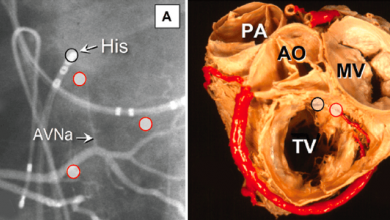Search results
Author(s):
Jackson J Liang
,
Pasquale Santangeli
,
David J Callans
Added:
3 years ago
Ventricular tachycardia (VT) is a significant cause of morbidity and mortality in patients with structural heart disease (SHD). While implantable cardioverter-defibrillators (ICDs) have been shown to be effective in preventing sudden death due to ventricular arrhythmias, they are not able to prevent recurrent VT episodes. Antiarrhythmic drugs (AADs) have some demonstrated efficacy in preventing…
View more
Author(s):
Dominik Linz
,
Sander Verheule
,
Aaron Isaacs
,
et al
Added:
2 years ago
Author(s):
Pier D Lambiase
,
Joseph De Bono
,
Martin Lowe
,
et al
Added:
3 years ago
Heart rhythm consultants, primary care physicians, specialist registrars, nurses and physiologists may be requested to review ECGs or advise on cases where antipsychotic-induced QT prolongation is suspected or evident. The British Heart Rhythm Society has issued the Clinical Practice Guidelines on the Management of Patients Developing QT Prolongation on Antipsychotic Medication to support them…
View more
Author(s):
Konstantinos N Aronis
,
Rheeda L Ali
,
Jialiu A Liang
,
et al
Added:
3 years ago
The pathophysiology of AF is complex and incompletely understood to date.1,2 AF is a progressive disease of the atria involving a multitude of mechanisms related to its initiation, maintenance and progression. Experimental evidence suggest that AF is characterised by alternations in atrial size, shape electrophysiology, autonomic innervation, and cardiomyocyte metabolism, as well as development…
View more
AF Ablation in HFpEF
Author(s):
Nicolas Johner
,
Mehdi Namdar
,
Dipen Shah
Added:
1 year ago
Article
Author(s):
Jorge G Panizo
,
Sergio Barra
,
Greg Mellor
,
et al
Added:
3 years ago
Premature ventricular complexes (PVCs) are the most common ventricular arrhythmia. Their prognostic significance cannot be interpreted without considering the presence or absence of any associated underlying cardiac condition. In the absence of structural heart disease, PVCs were generally considered to be benign.1,2 In the 1970s and 1980s, it was postulated that frequent PVCs could be a trigger…
View more
Author(s):
A John Camm
,
Bernard J Gersh
,
Demosthenes G Katritsis
Added:
3 years ago
Inherited arrhythmias comprise a group of disorders with inherited susceptibility to arrhythmias and conduction disturbances due to mutations in genes mainly encoding the Na+, and K+ channels, and other arrhythmogenic mechanisms such as those linked to Ca++ transport (Table 1).1 The majority of heritable cardiomyopathies and channelopathies are associated with disease-susceptibility genes…
View more
Author(s):
Suneet Mittal
,
David Golombeck
,
Jacqueline Pimienta
Added:
2 years ago
Author(s):
José-Ángel Cabrera
,
Robert H Anderson
,
Andreu Porta-Sánchez
,
et al
Added:
2 years ago















 « First
« First